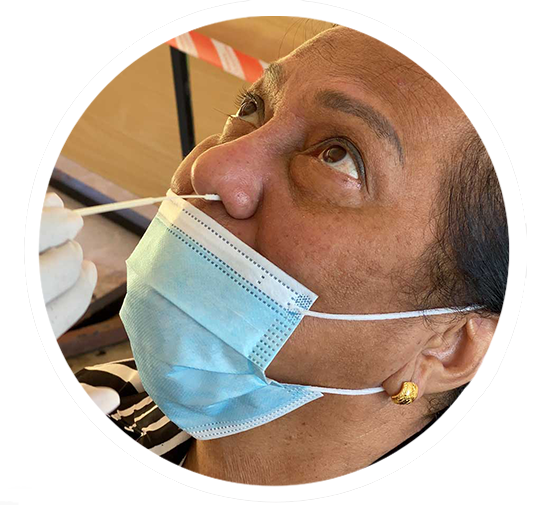Walk-ins are Welcome please call on (872) 228 1711
Click here for FREE transportation to and from your vaccination appointment available – Or call to schedule your ride.

All COVID-19 testing is free of charge regardless of insurance or immigration status.
COVID-19 tests are free to everyone. Privacy protected under HIPPA Laws.

There are three methods of testing; Nasal swab or saliva, and blood draw.
A person can be tested at a walk-in, drive-thru, or mobile location.
A person needs to be tested if they come in contact with someone who tested positive for COVID-19 or suspects they have been around others who might be positive.
Always have a test if you exhibit coronavirus symptoms: fever or chills; cough; shortness of breath or difficulty breathing; fatigue; muscle or body aches; headache; new loss of taste or smell; sore throat; congestion or runny nose; nausea or vomiting; and diarrhea.

All COVID-19 testing and related services must be free of charge to Illinois residents, regardless of insurance or immigration status. Some providers are charging Illinois residents for COVID-19 tests, and/or requiring Illinois residents to receive a COVID-19 serology test to check for antibodies prior to, and as a condition of, administering a COVID-19 diagnostic test. Any provider who continues these practices risks investigation, financial consequences, or other sanctions from the State of Illinois. For tips on what situations will trigger a surprise medical bill, and what do to if you receive one, read more in this Consumer Reports article.
Cook County uses two types of tests to determine if a person is currently infected with SARS-CoV-2, the virus that causes COVID-19 and its variants or if they have antibodies present indicating they have had the virus. The viral test uses specimens from a person’s nose or mouth.
CDC recommends that anyone with any signs or symptoms of COVID-19 get tested, regardless of vaccination status or prior infection. If you get tested because you have symptoms or were potentially exposed to the virus, you should stay away from others pending test results and follow the advice of your health care provider or a public health professional.
There are a variety of places offering walk-in, drive-thru, or mobile testing for COVID-19. Links offer the most current locations available. These include:
If you need to be tested for COVID-19 and can’t get tested by a healthcare provider, you can consider using either a self-collection kit or a self-test that can be performed at home or anywhere else. Sometimes a self-test is also called a “home test” or an “at-home test.”
When taking the test, make sure to follow all instructions for performing the test.
Contact tracing is a tool that can help slow the spread of infectious diseases, such as coronavirus disease 2019 (COVID-19). In communities using contact tracing, clinics, labs, and hospitals send the names of people who have recently been diagnosed with COVID-19 to their local health department.
The health department asks each person with COVID-19 about people with whom they’ve recently had close contact. Health department officials then quickly (usually within 24 hours) alert people who are close contacts that they may have been exposed to the COVID-19 virus. Officials don’t share the name of the person who may have exposed them. This makes the contact tracing process anonymous and confidential.
The sooner health officials can alert close contacts, the lower the risk of the COVID-19 virus spreading further, according to William F. Marshall, III M.D. and the Mayo Clinic
Copyright @ 2021. All Rights Reserved.